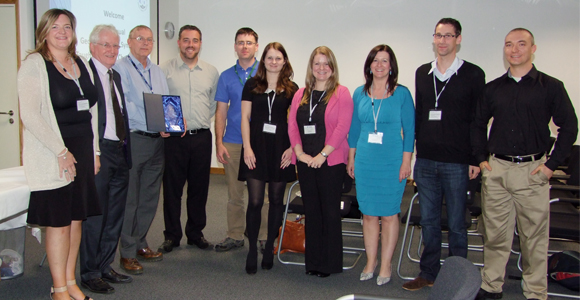In This Section
1st Annual George Guilbault Symposium

The 1st Annual George Guilbault Symposium was hosted at Tyndall National Institute, University College Cork, Ireland on the 11th and 12th September 2014.
This is the first year that this Symposium has been organised to honour and celebrate the enormous contribution to the Department of Professor George G. Guilbault. The Symposium brought together both the current MSc class of 2013/14 and the new MSc class of 2014/15 undertaking the taught postgraduate courses in Analytical Chemistry. The 2013/14 MSc students presented to their peers on the 11th September. A shortlist of 10 presentations where selected to compete for the 1st George Guilbault Analytical Chemistry MSc Postgraduate Student Award on the 12th September. All of the presentations were of high standard and it was very difficult to select an overall winner from the students.
Representatives from the established Industry Advisory Board chose Mr Leonard Gardiner as the 2014 winner. The new class of 2014/15 got an opportunity to see the type of projects and research that the current class did this year. Ms Breda Moore from TE Laboratories, Carlow and Ms. Anna Davies from Almac, Belfast gave keynote presentations along with Prof. Cian O’Mathuna from Tyndall National Institute. The Chemistry Head of Department, Prof. Martyn Pemble, Head of Analytical Section, Prof. Jeremy Glennon and Taught Analytical MSc Programme Director, Dr Eric Moore presented Mr Gardiner with the award. The Symposium was a great success and we look forward to continuing with this tradition into the future.
George G. Guilbault was the 1st Chair Professor of Analytical Chemistry at University College Cork, Cork, Ireland. He spent 29 years at the University of New Orleans as Research Professor of Analytical Chemistry. He originated the field of biosensors in 1961 when he described the first immobilized enzyme prototype, a system used by NATO as its Nerve Agent Alarm from 1963 until 1985. In 1969 he described the first potentiometric biosensor for urea assay. He has been involved in all types of biosensor research: new immobilization methods for binding antigens, enzymes, antibodies and other biological compounds; electrochemical, piezoelectric and fiber optic transducers for use in biosensor in the gas phase (the first published report of use of an enzyme in 1984 and of an antibody based sensor in 1987).
Professor Guilbault was author of more than 350 research papers, 56 book chapters, 66 review articles, and 11 books, most in the area of biosensors. Since 1987 he was the editor of Analytical Letters (Marcel Dekker, Inc.), an international journal which currently publishes a very large section on biosensors and remained the chief editor until his unexpected death in Dec 2008. He was the co-ordinator of the M.Sc. program in analytical chemistry at University College Cork. He received the B.S. degree (1958) from Loyola University, Chicago, Illinois, and the M.S. (1959) and Ph.D. (1961) degrees from Princeton University, New Jersey. He won the Potts award in Life Science in 1983 by The Franklin Institute for developing improved techniques, less expensive determination of substances of biological instances.
Click Here to view photos from the event.
School of Chemistry
Scoil na Ceimic
Contact us
Second Floor, Kane Building, University College Cork, T12 YN60
